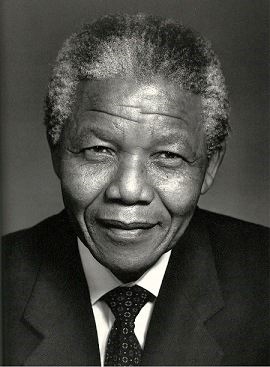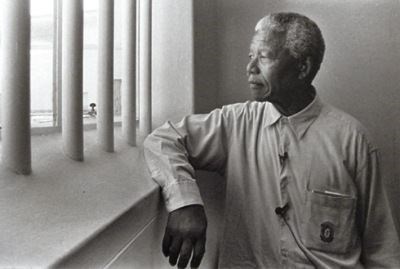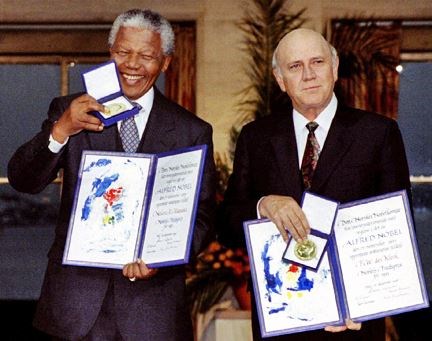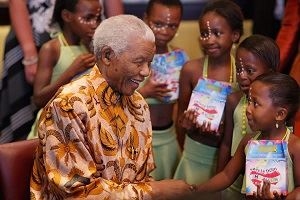 |
| A portrait of Nelson Mandela. (https://www.google.com/url?sa=i&rct=j&q=&esrc=s&so ()) |
Picture this: A time where eating at a certain table in a restaurant could get you thrown into jail; where you could not drink out of the same fountain as others or even attend the school two blocks away; where you could work just as much or even harder than your colleague, but still get paid less yearly than they do weekly; just because your skin was a different color than your neighbor's. For Nelson Mandela, this was no make-believe movie; it was the grim aspect of a black man's daily life affected by the segregational laws created in South Africa, known as the Apartheid. However, he did not sit back and watch. He dedicated his life to revolutionize South Africa and flourish the birth of equality. Born in 1918, Nelson Rolihlahla Mandela was the prince of his regal parents, Chief Gadla Henry Mphakanyiswa and Nosekeni Fanny. He was raised in the royal Thembu House in Transkei, South Africa where he was educated at Healdtown and later attended Fort Hare University. Mandela became the first black president of South Africa in 1944. He joined the National African Congress (ANC) in 1941 and was repeatedly arrested as a result. After 27 years of imprisonment, he was released in 1990 and in less than five years, became president. His birth name was Rolihlahla, meaning tree shaker or troublemaker in Xhosa; which was quite appropriate as he shook the world of the unjust apartness in South Africa and continues to inspire many people through his compassionate views and pure determination. He is, and will truly be a revolutionary hero for many years to come.
 |
| Nelson Mandela looking out of his cell window. (http://2.bp.blogspot.com/-mQMw77olvFg/Udg7JPjJXCI/ ()) |
Mandela exerted a strong compassion and dutiful forgiveness towards others, earning him the embodiment of a trustworthy leader. Subsequent to his release in 1990, he persisted his passionate work as volunteer-in-chief: "[it] took him to many parts of the country to organize resistance to discriminatory legislation. [He] played an important part in leading the resistance to the Western Areas removal scheme, which forced residents out of their homes [...] and also to the introduction of the Bantu Education Act (1953), which enforced separation of races in all educational institutions including the curriculum" (Keller). Mandela spent most of his life dedicating his work to help others; especially after the National Executive Committee of ANC recruited him in 1950. He used this position to aid people ubiquitously who faced the atrocious depths of discrimination so they could be offered a chance to grasp their liberty. Regardless of any situation, Mandela's spirit was always present as he was incredibly sympathetic and forgiving. In his book, A Long Walk To Freedom, he says: "' Even in the grimmest times in prison, when my comrades and I were pushed to our limits, I would see a glimmer of humanity in one of the guards, perhaps just for a second, but it was enough to reassure me and keep me going. Man's goodness is a flame that can be hidden but never extinguished'" (Mandela). After his father's passing in the early years of Mandela's childhood, he became a well-known, relentless rebel all his life. Nevertheless, he continuously exerted mercy and sympathy even to those who least deserved it. He was faithful in equality and believed that everyone would one day be healed of the false teachings of hate. Throughout his 95 years of agony and desolation, he seemed to conjure up a beaming sense of encouragement and warmth, giving a sense of natural-born leadership for others to follow throughout the pitiful days of the Apartheid.
 |
| Mandela and de Klerk awarded a Nobel Peace Prize. (http://www.southafricancoins.org/south-african-coi ()) |
Through his piercing determination, Mandela was able to sustain his positivity to end the Apartheid, become president, and earn the respect and devotion of his loyal followers. During his 27 years imprisoned, Mandela conducted such faith and perseverance as he displays when: "President P.W. Botha offered to free Mandela in 1985 if he agreed to abandon armed struggle, but Mandela refused" (Williams). Being arrested never knocked Mandela off his feet. All his life he was an incriminating target, but still persevered until the end. Yet, when he was offered freedom of his burden, he manifested a confident defiant despite his criminal title. Mandela documented his journey in freeing South Africa of it's dilapidated chains of segregation; he says: "'During my lifetime I have dedicated myself to the struggle of the African people. I have fought against white domination, and I have fought against black domination. I have cherished the ideal of a democratic and free society in which all persons live together in harmony and with equal opportunities. It is an ideal which I hope to live for and to achieve. But, if needs be, it is an ideal for which I am prepared to die'" (Kile). This quote from Mandela depicts how he was willing to sacrifice his life to fight and defy unequal opportunities caused by the Apartheid. He has suffered and struggled all his life; and will not live to see it destroy others. The faith he exhibited did not only replenish himself; it radiated through the hearts of South Africans and gave them a glimpse of a brighter future ahead.
 |
| Mandela passing out lunches at a benefit event. (https://www.google.com/url?sa=i&rct=j&q=&esrc=s&so ()) |
From a royal upbringing to being the most outlawed criminal, and then becoming the first black president of South Africa, Nelson Mandela persevered with solicitude and strived to fulfill not only his own dreams, but the futures of many. After retiring as president for five years, "Mandela continued to speak with the same moral force and devotion to democracy, equality, and commitment to conflict resolution, and he continued to work for the elimination of poverty, as well as the improvement of public health in Africa, especially with regard to HIV/AIDS. He remained an inspiration to fair-minded people all over the world" (Korieh). His constant determination throughout his constantly revolving life inspires others to imagine the unexpected possibilities in a dedicated lifetime. After ending the Apartheid, he went beyond when he retained his devotion for the rest of his life to other economical issues. Nelson Mandela had an ability to inspire himself as it reflected onto the souls of South Africans who had lost their hope and voice: "'I cherish my own freedom dearly, but I care even more for your freedom. Too many have died since I went to prison. Too many have suffered for the love of freedom'" (Mandela). He was not an egoist; he exuded humility- a characteristic of being humble and reserved that was simultaneously compassionate. He went beyond himself and sacrificed his freedom so that one day anyone would be able to eat wherever they would like; to have a drink on a scorching afternoon; enjoy the convenience in equal education; or even work for equal salary. He inspires anyone to achieve their goals and not to simply "sit back and watch the movie".
Works Cited Kile, J. "Nelson Mandela." Moral Heroes. N.p., 11 Jan. 2014. Web. 25 Mar. 2015. Korieh, Chima. "Nelson Mandela." Encyclopedia of Western Colonialism since 1450. Ed. Thomas Benjamin. Detroit: Macmillan Reference USA, 2007. Biography in Context. Web. 24 Mar. 2015. Mandela, Nelson. Long Walk to Freedom: The Autobiography of Nelson Mandela. Boston: Little, Brown, 1994. Print. Williams, Michael W. "Nelson Mandela." Great Lives From History: The Twentieth Century (2008): 1. Biography Reference Center. Web. 24 Mar. 2015.
Page created on 4/21/2015 12:00:00 AM
Last edited 4/21/2015 12:00:00 AM
